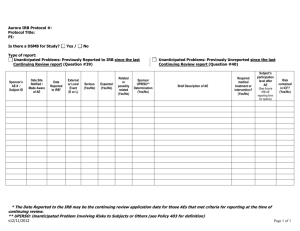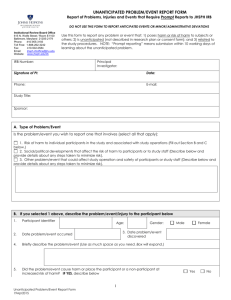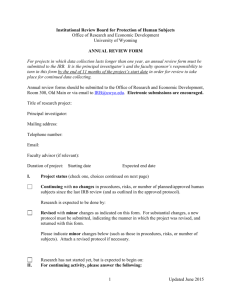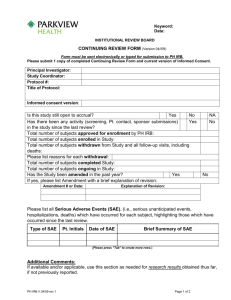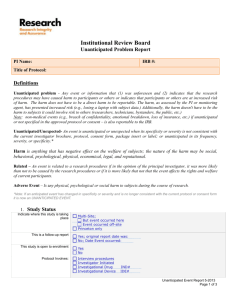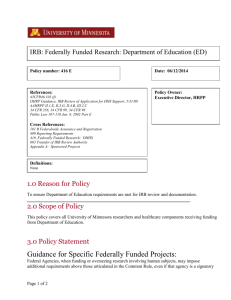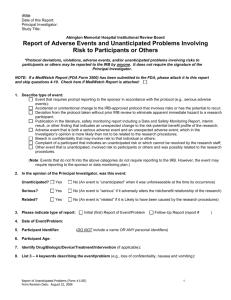Draft 10.01.08
advertisement
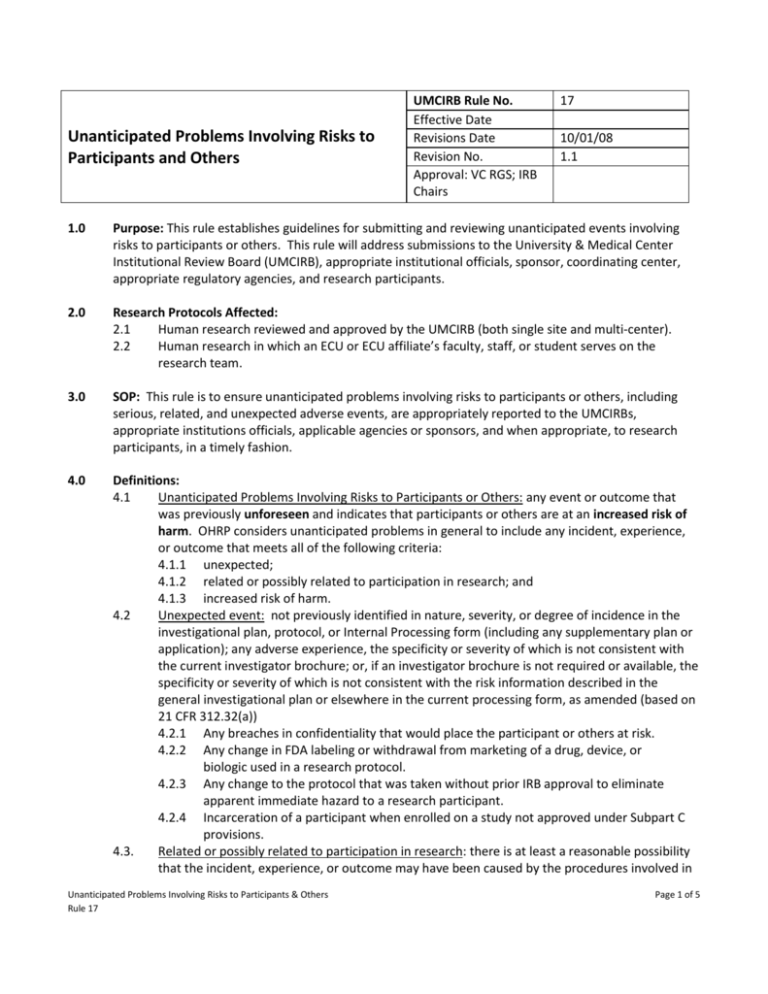
Unanticipated Problems Involving Risks to Participants and Others UMCIRB Rule No. Effective Date Revisions Date Revision No. Approval: VC RGS; IRB Chairs 17 10/01/08 1.1 1.0 Purpose: This rule establishes guidelines for submitting and reviewing unanticipated events involving risks to participants or others. This rule will address submissions to the University & Medical Center Institutional Review Board (UMCIRB), appropriate institutional officials, sponsor, coordinating center, appropriate regulatory agencies, and research participants. 2.0 Research Protocols Affected: 2.1 Human research reviewed and approved by the UMCIRB (both single site and multi-center). 2.2 Human research in which an ECU or ECU affiliate’s faculty, staff, or student serves on the research team. 3.0 SOP: This rule is to ensure unanticipated problems involving risks to participants or others, including serious, related, and unexpected adverse events, are appropriately reported to the UMCIRBs, appropriate institutions officials, applicable agencies or sponsors, and when appropriate, to research participants, in a timely fashion. 4.0 Definitions: 4.1 Unanticipated Problems Involving Risks to Participants or Others: any event or outcome that was previously unforeseen and indicates that participants or others are at an increased risk of harm. OHRP considers unanticipated problems in general to include any incident, experience, or outcome that meets all of the following criteria: 4.1.1 unexpected; 4.1.2 related or possibly related to participation in research; and 4.1.3 increased risk of harm. 4.2 Unexpected event: not previously identified in nature, severity, or degree of incidence in the investigational plan, protocol, or Internal Processing form (including any supplementary plan or application); any adverse experience, the specificity or severity of which is not consistent with the current investigator brochure; or, if an investigator brochure is not required or available, the specificity or severity of which is not consistent with the risk information described in the general investigational plan or elsewhere in the current processing form, as amended (based on 21 CFR 312.32(a)) 4.2.1 Any breaches in confidentiality that would place the participant or others at risk. 4.2.2 Any change in FDA labeling or withdrawal from marketing of a drug, device, or biologic used in a research protocol. 4.2.3 Any change to the protocol that was taken without prior IRB approval to eliminate apparent immediate hazard to a research participant. 4.2.4 Incarceration of a participant when enrolled on a study not approved under Subpart C provisions. 4.3. Related or possibly related to participation in research: there is at least a reasonable possibility that the incident, experience, or outcome may have been caused by the procedures involved in Unanticipated Problems Involving Risks to Participants & Others Rule 17 Page 1 of 5 4.4 4.5 the research. UMCIRB extends this definition to a minimum of 30 days post-administration of the test article or intervention Increased risk of harm: suggests that the research places participants or others at a greater risk of harm (including physical, psychological, economic, or social harm) than was previously known or recognized. Serious event: Any research-related event (occurring at any dose or level of intervention) that results in any of the following outcomes: 4.5.1 Death: Must be reported within two business days of the PI becoming aware of the event 4.5.2 Life-threatening event: Must be reported within business two days of the PI becoming aware of the event 4.5.2.1 Life-threatening: Any event that places the participant, in the view of the Principal Investigator, at immediate risk of death from the reaction as it occurred, i.e., it does not include a reaction that, had it occurred in a more severe form, might have caused death (based on 21 CFR 312.32(a)). 4.5.3 Inpatient hospitalization or prolongation of existing hospitalization: the participant must be hospitalized as a result of the event or, if the participant is already hospitalized, that hospitalization is prolonged. Must be reported within two business days of the PI becoming aware of the event 4.5.4 A persistent or significant disability/incapacity: Must be reported within two business days of the PI becoming aware of the event 4.5.4.1 Disability: A substantial disruption of a person’s ability to conduct normal life functions 4.5.5 Congenital anomaly or birth defect:. Must be reported within two business days of the PI becoming aware of the event 4.5.6 Any event, based upon the judgment of the principal investigator, which jeopardizes the well-being of the human research participant or others and may require medical or surgical intervention to prevent one of the outcomes listed above. Must be reported within two business days of the PI becoming aware of the event 4.5.7 Unexpected change to the risks or potential benefits: Any publication in the literature, safety monitoring report, interim result, or other finding that indicates an unexpected change to the risks or potential benefits of the research. Must be reported within five business days of the PI becoming aware of the event. Examples include, but are not limited to: 4.5.7.1 An interim analysis or safety monitoring report indicating that harms or benefits may differ than those initially reviewed and approved by the IRB; 4.5.7.2 Published work from another (related in some manner) study which purports findings which differ from the proposed risks or benefits initially reviewed and approved by the IRB for the study at hand). 4.5.7.3 Any complaint of a participant that indicates an unanticipated risk or one which cannot be resolved by the research staff. 4.5.7.4 Any unanticipated adverse device effect. 4.5.7.5 Any change in the informed consent/assent document as a result of new information or newly identified risks or benefits. 4.5.7.6 Any other information that might represent unanticipated problems involving risks to participants or others. Unanticipated Problems Involving Risks to Participants & Others Rule 17 Page 2 of 5 4.6 Administrative Hold: A directive of the FDA, the sponsor, or the facility at which the research is being conducted, a DSMB, or a convened IRB, IRB chair, or a facility's Institutional Official, to temporarily stop some or all research activities pending a specified action. Administrative holds are usually based on identification of information that may place participants or others at risk unless additional safeguards are put in place. Must be reported within five business days of the PI becoming aware of the event 5.0 Responsibilities: 5.1 Institutional Review Board will review all unanticipated problems involving risks to participants and others including related, serious adverse events to determine whether: 5.1.1 the study poses potentially greater risks than benefits to participants 5.1.2 the research procedures should be modified to minimize the risk of the event occurring again 5.1.3 The consent document should be modified to inform potential participants of the risk of the event. 5.1.4 All current and previously enrolled participants should be informed of the event through re-consenting. 5.1.5 The study should be suspended until such time that the risks can be minimized. 5.1.6 The study should be terminated, i.e., risks to participants outweigh any potential for benefit that can be gained from participation in the study. 5.1.7 Review of any administrative hold placed on a study by a sponsor, a Data Safety and Monitoring Board, a facility at which the research is conducted, or by another IRB and take appropriate actions to protect the welfare and safety of participants. 5.1.8 Request additional information as necessary when the event, at the time of reporting, was not resolved, or when additional information is required to make a determination 5.2 UMCIRB Administrative Director or designee will ensure compliance with this policy. 5.3 The IRB Chairperson or designee will review all materials when submitted to determine if immediate action is required 5.3.1 The IRB Chairperson has the authority, immediately upon notification of an unanticipated event to suspend enrollment or research procedures to protect participants’ safety and welfare. 5.3.2 Suspension of enrollment or research procedures will be conveyed immediately to the Principal Investigator, both verbally and in writing. 5.3.3 The IRB Chairperson’s or designee’s actions will be reported at the next convened meeting of the designated IRB. 6.0 Procedures: 6.1 Administrative Director or designee will: 6.1.1 Assist in review of submitted reports, at the request of UMCIRB Chair or IRB staff. 6.2 If a submitted report implies the potential for immediate harm to participants and others: 6.2.1 IRB staff will notify the Administrative Director who immediately notifies the appropriate IRB Chairperson or designee 6.2.2 Collectively the Chair, Director and staff member will make a decision on what action, if any, is required to best protect participants. These actions can include, but are not limited to: 6.2.2.1 suspending the study, Unanticipated Problems Involving Risks to Participants & Others Rule 17 Page 3 of 5 6.3 6.4 6.2.2.2 suspending enrollment, 6.2.2.3 no further intervention can occur (unless in the best interest of the participant), 6.2.2.4 the study should be put under a different PI, nursing staff, or coordinator 6.2.3 The PI is immediately notified of the decision both verbally and in writing of any action that is required The UMCIRB will: 6.3.1 review only unanticipated events involving risks to participants or others which are related to the administration of the test article, are unexpected in nature including severity or frequency, and have the potential for increased risk of harm to the participants or others 6.3.2 review the actions taken by the Chairperson or designee regarding suspension of research activities (see Section 6.2.2) and determine whether such actions should be continued, additional actions are required or the imposed actions should be lifted. 6.3.3 deliberate on any actions required to protect participants’ safety and welfare 6.3.4 suspend any or all research procedures until such time that the risks to participants can be minimized. 6.3.5 terminate the research based on the determination by the IRB that the risks outweigh any potential for benefit from participation, now or in the future. 6.3.6 provide UMCIRB determinations, in writing, to the Principal Investigators. Actions can include, but are not limited to: 6.3.6.1. Accept the report as submitted, with no further action required 6.3.6.2 Request additional information/clarification. 6.3.6.3 Require the consent document and/or protocol to be revised to reflect information relative to the event. 6.3.5.4 Suspend all or some of the procedures or terminate approval when there appears to be a major risk to participants until such time that the Principal Investigator can demonstrate that revised procedures have been put in place to protect the welfare and safety of participants. 6.3.7 Internal events that are not related or not possibly related or are serious but do not place participants or others at risk of harm will not be accepted unless the PI can demonstrate that these events are routinely occurring and may have possible negative implications for participants or others. Distribution List: List of agencies or institutional entities which, if providing financial support or have oversight responsibilities, would be notified in the determination of unanticipated problems involving risks to participants or others 6.2.1 Agency for International Development (22 CFR 225) 6.2.2 Central Intelligence Agency (Executive order) 6.2.3 Consumer Products Safety Commission (16 CFR 1028) 6.2.4 Department of Agriculture (7 CFR 1c) 6.2.5 Department of Commerce (15 CFR 27) 6.2.6 Department of Defense (32 CFR 219) 6.2.7 Department of Education (34 CFR 97) 6.2.8 Department of Energy (10 CFR 745) 6.2.9 Department of Health and Human Services (45 CFR 46) 6.2.9 Department of Homeland Security (Public law 108-458 Sec. 8306) Unanticipated Problems Involving Risks to Participants & Others Rule 17 Page 4 of 5 6.2.10 6.2.11 6.2.12 6.2.13 6.2.14 6.2.15 6.2.16 6.2.17 6.2.18 6.2.19 6.2.20 6.2.21 6.2.22 6.2.23 6.2.24 6.2.26 6.2.27 6.2.28 Department of Justice (28 CFR 46) Department of Transportation (49 CFR 11) Department of Veterans’ Affairs (38 CFR 16), Office of Research Oversight Environmental Protection Agency (40 CFR 26) Housing and Urban Development (24 CFR 60) National Aeronautics and Space Administration (14 CFR 1230) National Institutes of Health and Human Services (45 CFR 46) National Science Foundation (45 CFR 690) Office of Science and Technology Policy (Adoption of policy) Social Security Administration (Public law 7.5.26) Food and Drug Administration (21 CFR 56) Office for Human Research Protections External sponsors Institutional Official Division, Department, or Unit Chairperson and Dean Administrators at Affiliate site(s) Director, Office of Research Compliance Administration Any Compliance Officers, Risk Management, or State Agencies that may have a need to be informed 6.2.29 Biomedical and/or Social & Behavioral IRB members and ex-officios 7.0 Revision History: Date Revision # 10/01/09 1.1 Change New format; Clarification on authority, procedures, what is reportable Reference Section(s) All Sections References 21 CFR 312.32(a) OHRP Guidance, January 15, 2007 Unanticipated Problems Involving Risks to Participants & Others Rule 17 Page 5 of 5
